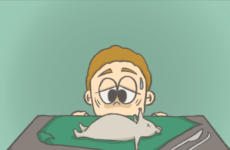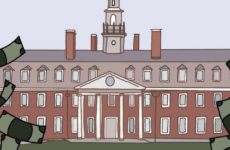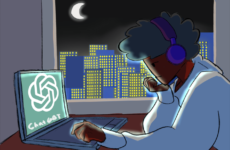The further we get into the election season, the more space politics takes up in our thoughts and our discussions. This increased political discourse has recently spurred a lot of talk about the lack of conservative voices on campus. While that is definitely not something to take lightly, I think that a lot of people are placing too much blame where it does not necessarily belong. The lack of conservative opinions on this campus is not entirely because liberal voices are shutting down conservative voices; conservative voices are simply being drowned out as popular sentiment shifts towards the left and the number of conservatives at Choate shrinks.
A vast majority of Choate students are liberal, or at least socially progressive, so of course more liberal voices will be present on campus. The skewed representation on campus is in no way the fault of the people speaking — if the minority of conservatives want their opinions to be heard, they must as least be willing to speak up about them. The truth is that conservatives have been less than eager to state their opinions even when offered the opportunity to do so. The Choate Diversity Student Association (CDSA) hosted a discussion about conservatism at Choate during winter term where they invited conservatives and liberals to discuss the absence of conservative voices at Choate, as well as to explore how Choate students can make their conversations more inclusive for people all over the political spectrum. Unfortunately, very few people who identified as conservative showed up, and even fewer actually contributed to the discussion. It is frustrating to hear people complain that their voices are not being heard when there are organizations on campus actively working to create opportunities specifically to address that issue. The truth is that conservatives have not been adequately taking advantage of these opportunities to increase their representation on campus.
Perhaps conservatives at Choate need a lesson on the importance of speaking up about their ideals even when they may be met with dissent. Coming from a school where I was one of a very small circle of liberals, I understand how intimidating it can be to voice your opinion when you know you are in the minority. While it is inevitable that people will disagree with you, you must accept this as a consequence of voicing any opinion, liberal or conservative, and instead focus on what makes the expression of varying ideals so important to a community: differing opinions foster necessary conversations that challenge the status quo in hopes of finding better solutions to the issues at hand.
I have also noticed that people oftentimes mistake disagreement with refusal to listen, which eventually discourages contribution to a discussion where one’s ideas are at risk of being challenged. As Richard Dreyfuss said, “Civility is not the absence of critical analysis” — in other words, someone disagreeing with you is not the same as someone refusing to listen to you. Disagreement must be embraced, as it is fundamental to effective political discourse. Unless your opinion is offensive or disrespectful, I, like most politically active liberals on campus, will gladly listen and respond to it, simply because I enjoy political discussions.
The point of this article is not to shift the blame entirely onto conservatives, although they could certainly make a better effort to make themselves heard on campus. Of course, liberal students at Choate must also work on creating environments that are more conducive to conservative voices, especially in the classroom. I have heard countless stories about – and been a part of — attacks on conservatives during class discussions. While it is not necessarily the expression of liberal viewpoints in the classroom that is the issue, it is crucial to maintain awareness of the harshness of one’s attitude to a person with a different opinion. We must be sure to maintain a level of respect for others during political discussions — not only because it is simply impossible to effect change without it, but also because political discourse is neither effective nor interesting if it’s one-sided. The unavoidable truth is that increasing the representation of conservative voices on campus cannot be done solely by liberals or conservatives at Choate — it is a collaborative effort that requires the cooperation of both.




